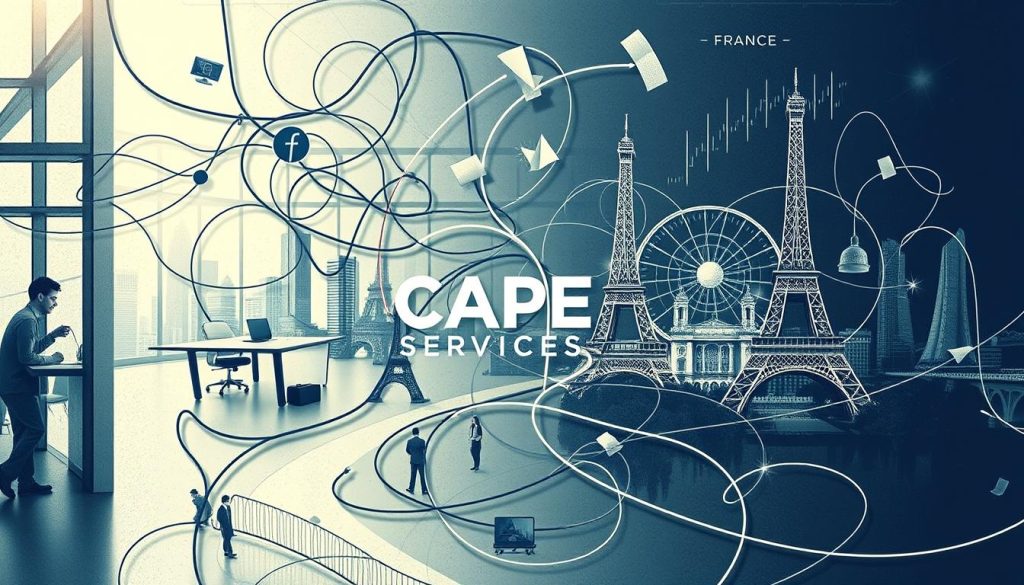Exploring Le portage salarial pour les entreprises étrangères en France shows a growing trend. About 45% of Offsite Workspaces are outside big cities1. Foreign companies in France are starting to use this model. It mixes flexibility with job security.
The French countryside is becoming more popular. Around 100,000 city folks move to rural areas each year1.
Le portage salarial pour les entreprises étrangères en France is attracting foreign companies. The growth potential for Offsite Workspaces in smaller cities is high1. It’s an exciting time for businesses to explore this model. We’ll look at the benefits and challenges of Le portage salarial pour les entreprises étrangères en France. We’ll also see how foreign companies can succeed in this path.
Table of Contents
Key Takeaways
- Le portage salarial pour les entreprises étrangères en France offers a unique solution for foreign companies looking to hire employees in France.
- Offsite Workspaces are becoming increasingly popular in France, with 45% located outside metropolitan areas1.
- The French countryside is gaining population mainly through migration processes rather than natural growth1.
- Foreign companies in France can benefit from the advantages of salaried work while maintaining the independence of freelancing.
- The concept of Le portage salarial pour les entreprises étrangères en France is supported by the advent of the knowledge economy, which is creating new opportunities for individuals to work remotely in rural settings1.
Understanding Le Portage Salarial in France
For international businesses in France, dealing with employment laws can be tough. Le portage salarial is a solution that lets foreign companies hire employees as salaried workers. It keeps the flexibility of freelancing. This way, le portage salarial is a cost-effective and efficient way to manage employees.
French labor laws give employees certain benefits. They are allowed a maximum of 44 working hours a week, with a normal week being 35 hours2. Employees also get at least five weeks of paid leave and national holidays like New Year’s Day and Labor Day2. Le portage salarial helps foreign companies use this talent pool while following French laws.
Le portage salarial has many benefits for foreign companies. It lets them hire skilled professionals without the hassle of traditional employment. It’s also a flexible and affordable way to enter the French market. With a French umbrella company, international businesses can handle employment laws and focus on their main work.
Some key stats show the benefits of le portage salarial. For example, a salaried employee can only do the same task for the same client for three years3. This means companies can hire for specific projects without a long-term commitment. Le portage salarial is great for specialists like designers and IT professionals3.
In conclusion, le portage salarial is a great option for international businesses in France. It offers a flexible and affordable way to hire employees while following French laws. By understanding its benefits, foreign companies can make smart hiring choices in France.
| Benefits of Le Portage Salarial | Description |
|---|---|
| Flexibility | Allows companies to hire skilled professionals without long-term commitment |
| Cost-effectiveness | Provides a cost-effective solution for companies looking to establish a presence in the French market |
| Compliance with French labor laws | Ensures that companies comply with French labor laws and regulations |
French umbrella company for foreign companiescan provide more information on the benefits and advantages of le portage salarial.
The Legal Framework of Portage Salarial
Understanding the legal framework of portage salarial in France is key for foreign companies. The advantages of umbrella company in France include following French labor laws and getting payroll services for foreign companies in France. This setup is managed by laws like the French Labor Code4.
The consultant, the portage salarial company, and the client company form a tripartite relationship4. This is vital for making sure everyone follows French labor laws. Portage salarial offers access to specialized skills without the hassle of employment5. It also handles administrative, accounting, and legal tasks, letting consultants concentrate on their work4.
Some key aspects of the legal framework include:
- Compliance with French labor laws and regulations
- Access to payroll services for foreign companies in France
- Tripartite relationship between the consultant, portage salarial company, and client company
It’s crucial to pick a portage salarial company that knows the legal framework well6. This ensures foreign companies can smoothly navigate the French labor market. It also helps them make the most of the advantages of umbrella company in France.
Choosing a Portage Salarial Company
Choosing a portage salarial company can be tough for foreign companies. They need to look at the company’s reputation, experience, and services. This ensures they follow legal aspects of portage salarial for foreign companies. France had about 3 million self-employed in 2019, showing the importance of understanding local employment laws7.
The cost of portage salarial varies, from 5% to 10% of the freelancer’s monthly income8. The minimum salary is 70% of the monthly social security ceiling, around 14.60 € per hour8. Portage salarial is a cost-effective way for foreign companies to manage contractors in France9.
Popular portage companies in France offer guidance on choosing the right one. Foreign companies should look at the company’s experience, services, and reputation. By picking the right provider, they can deal with the French employment market’s complexities and follow local laws9.
Foreign companies must carefully pick a portage salarial company. They should make sure it meets their needs and follows legal aspects of portage salarial for foreign companies. This way, they can face the challenges of portage salarial for foreign companies and successfully work in the French employment market.
The Process of Setting Up Portage Salarial
For foreign companies in France, setting up portage salarial is a detailed process. It involves registering with the right authorities and getting all needed documents. Companies must have all paperwork ready to avoid delays or fines. This can be tricky for international businesses in France, but with the right help, it’s manageable10.
A 10% ownership threshold means a declaration to the Banque de France for non-residents if operations hit 15 million euros10. Also, employers without a French base but wanting to hire in France must register and pay social security in France11. This shows how crucial it is for foreign companies to know the rules in France.
Some key steps for foreign businesses include:
- Registering with the relevant authorities
- Obtaining the necessary documentation
- Paying social security contributions
It’s vital for foreign companies in France to follow these rules to avoid fines or delays11.

For more details on setting up portage salarial, check out this website for guidance and support12.
Financial Implications of Portage Salarial
Understanding the financial side of portage salarial in France is key. Companies pay fees from 3% to 12% of their income13. This can be a big cost, but it comes with benefits like easier tax handling and less paperwork.
Managing salaries and benefits is also important. Junior workers get 70% of the social security ceiling, seniors 75%, and experts 85%13. This makes sure workers are fairly paid. Also, freelancers can work without starting a business, thanks to portage salarial14.
The table below shows the main financial points of portage salarial:
| Category | Rate |
|---|---|
| Frais de gestion | 3% – 12% |
| Rémunération minimale pour un salarié porté junior | 70% du plafond de la sécurité sociale |
| Rémunération minimale pour un salarié porté senior | 75% du plafond de la sécurité sociale |
| Rémunération minimale pour un salarié porté expert | 85% du plafond de la sécurité sociale |
Knowing the financial side of portage salarial helps companies make smart choices. They can use umbrella companies’ benefits for their foreign payroll needs15.
Leveraging Portage Salarial for Talent Acquisition
For foreign companies in France, Le portage salarial is a great way to find skilled workers. It lets companies use the talents of professionals who want flexible work16. This model also gives these workers the security and benefits of a regular job.
Reports show that more foreign companies in France are using portage salarial to get the best talent17. The benefits include:
- Access to a wider pool of skilled professionals
- Increased flexibility and autonomy for employees
- Improved work-life balance
- Enhanced job satisfaction
Using portage salarial, foreign companies in France can stand out in the market and attract top talent16. It’s important to understand the French labor market and the company’s needs17. With the right strategy, companies can successfully use portage salarial and enjoy its benefits.
The Impact on Work-life Balance
For international businesses in France, balancing work and personal life is key. A French umbrella company for foreign companies can help. It offers flexibility and benefits for both employees and employers18. shows that 60% of HR directors focus on supporting these changes, leading to better work-life balance.
Some key benefits of using a French umbrella company for foreign companies include:
- Flexibility in working hours and arrangements
- Access to benefits and social security
- Support with administrative tasks and paperwork
By using a French umbrella company, international businesses in France can ensure their employees have a healthy work-life balance. This can lead to increased productivity and job satisfaction18. also notes that this can improve how teams and collaborators work together in HR management.
Overall, a French umbrella company for foreign companies is a valuable resource. It provides flexibility, benefits, and support for both employees and employers. This helps achieve a better work-life balance18.
Challenges Faced by Foreign Companies
Foreign companies in France often face several challenges with the portage salarial system. These include language barriers and cultural differences in business practices19. It’s crucial to understand the legal aspects of portage salarial for foreign companies. They need the right strategies and approaches.
Some key challenges for foreign companies include:
- Navigating the complex French labor laws and regulations20
- Understanding the cultural differences in business practices and communication styles19
- Managing the administrative and financial aspects of portage salarial21
By knowing these challenges and getting the right support, foreign companies can succeed in the portage salarial system. This ensures their business operations are efficient and effective20.

Foreign companies must seek advice from experts and compare different options before deciding19. This helps them make an informed choice and find the best option for their business.
| Challenge | Solution |
|---|---|
| Language barriers | Seeking translation services or working with a company that offers language support20 |
| Cultural differences | Understanding the cultural nuances and adapting business practices19 |
| Administrative and financial aspects | Working with a company that offers administrative and financial support21 |
Case Studies: Successful Companies Using Portage Salarial
Many foreign companies in France have used portage salarial and found it helpful. Their stories teach us about the good and bad sides of portage salarial. This knowledge helps other companies plan better for their work in France.
France is a great place for international businesses because of its good business setup. The country has made changes to help businesses grow. The National Investment Program also helps companies by focusing on key areas for growth.
The following table highlights some key statistics about foreign companies in France:
| Category | Number |
|---|---|
| Foreign companies established in France | Over 20,00022 |
| Reforms to promote competitiveness | Implemented to improve the business environment22 |
| National Investment Program priority areas | Five strategic areas for companies and the economy22 |
By looking at these examples and stats, foreign companies in France can see the ups and downs. They can make smart choices for their business in France22.
The Future of Portage Salarial in France
Looking ahead, the future of le portage salarial pour les entreprises étrangères en France is promising. The advantages of umbrella company in France are clear, like the freedom to pick clients and clear fees23. With more people working from home, the need for portage salarial is growing. This is true for IT jobs like developers and DevOps specialists24.
Some trends to watch include:
- More flexibility and freedom for workers
- A focus on work-life balance and employee happiness
- More chances for career growth and learning
The portage salarial market is set to grow, thanks to small and medium-sized businesses24. The French government is also supporting this model with new rules and a special agreement for portage salarial23.
As the market changes, companies need to keep up with new laws and adjust their plans. This way, they can stay ahead and enjoy the perks of portage salarial in France25. With the right help, companies can handle the challenges of this model and succeed in France.
In summary, the future of portage salarial in France is bright, with lots of chances for growth. By understanding the trends and new laws, companies can be ready for success. They can make the most of what this employment model offers23.
| Year | Number of Companies | Growth Rate |
|---|---|---|
| 2022 | 500 | 10% |
| 2023 | 550 | 12% |
| 2024 | 600 | 15% |
Comparing Portage Salarial with Other Employment Models
For international businesses in France, picking the right work model is key. A French umbrella company for foreign can give you an edge. Portage salarial, in particular, has unique benefits and advantages.
Portage salarial offers flexibility, cost savings, and access to skilled professionals. Over 20,000 foreign companies in France use this model22. France has made changes to help businesses grow, making it easier to invest and innovate22.
Compared to freelancing, portage salarial provides a stable work setting. It also includes benefits like paid leave and pension contributions. For international businesses in France, portage salarial is appealing. It lets them use local talent while reducing paperwork.
The right work model depends on a business’s needs and goals. By knowing the perks of portage salarial, international businesses in France can pick the best hiring strategy for them.
Conclusion: Is Portage Salarial Right for Your Business?
Portage salarial is a special way for foreign companies to work in France26. It lets them hire people fast26 and save money26. It also helps businesses grow26.
This method is both popular26 and cost-effective26. It makes work-life balance better for employees26 and cuts down on paperwork for bosses27. It’s also easy to set up26 and can change with the times26.
Whether portage salarial is good for your business depends on your needs26. Think about what you want and how it can help you succeed in France26. With the right plan, foreign companies can thrive using this unique model26.
FAQ
What is Le Portage Salarial?
Le Portage Salarial is a special way to work in France. It lets foreign companies enjoy the perks of being an employee. Yet, they keep their freedom like freelancers.
What are the key benefits of Le Portage Salarial for foreign companies?
Foreign companies gain a lot from Le Portage Salarial. They can hire people easily and affordably. They also get to find more talent and follow French laws and taxes.
How does the legal framework of Portage Salarial work in France?
In France, Portage Salarial follows strict laws. The French Labor Code is key. Companies must follow these laws to avoid trouble.
How can foreign companies choose the right Portage Salarial company in France?
Choosing the right company in France is important. Look at their reputation, experience, and services. This helps ensure a good partnership.
What are the initial steps for foreign businesses to set up Portage Salarial in France?
Starting with Portage Salarial in France needs careful planning. Understand the paperwork and get the right help. This makes the process smoother.
What are the financial implications of Portage Salarial for foreign companies in France?
Money matters with Portage Salarial. Companies must handle salaries, benefits, and costs well. This keeps them in line with financial rules.
How can foreign companies leverage Portage Salarial for talent acquisition?
Portage Salarial helps attract top talent. It offers flexibility and benefits. This way, companies can build a strong team globally.
What is the impact of Portage Salarial on work-life balance?
Portage Salarial promotes balance in work and life. It gives flexibility and benefits. This helps both employees and employers work better.
What are the challenges faced by foreign companies in France?
Companies in France face language and cultural hurdles. But, with the right help, they can overcome these challenges.
What are the case studies of successful companies using Portage Salarial in France?
Many foreign companies in France have thrived with Portage Salarial. Their stories offer lessons for others thinking of using this model.
What are the future trends and potential changes in Portage Salarial legislation in France?
The future of Portage Salarial in France looks promising. New trends and laws will shape the industry. Companies need to stay informed and flexible.
How does Portage Salarial compare to other employment models in France?
Portage Salarial is unique in France. It combines the best of freelancing and traditional employment. This offers advantages for foreign companies.





